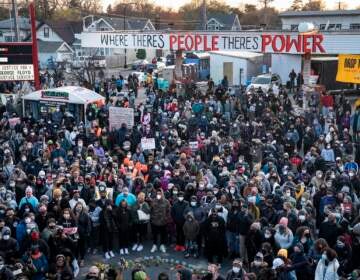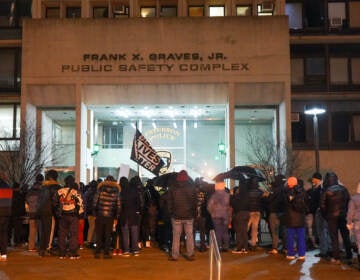Expungements can erase the stigma that haunts people of color

(ShutterStock)
A criminal record can haunt a person long after a case has ended, even if that person is found not guilty or all the charges against them are dropped. This stigmatization does nothing to ensure public safety, but everything to stifle the progress that people with criminal records are trying to make.
A criminal record can haunt a person long after a case has ended, even if that person is found not guilty or all the charges against them are dropped. Criminal records create a lifelong stigma that leads employers, landlords, and school admissions officers to make assumptions about applicants, and to shut people with criminal records out of the opportunities that should be available to them. This stigmatization and the subsequent loss of opportunity does nothing to ensure public safety, but everything to stifle the progress that people with criminal records are trying to make.
Black Lives Matter Philadelphia sheds light on the over-policing of communities of color and is partnering with Community Legal Services to address the long-term consequences. Statistics show that people of color are disproportionately placed in the criminal justice system, and are therefore disproportionately burdened with incredible barriers to self-sufficiency and opportunity as a result of the criminal records that remain. In fact, researchers have found that the existence of a criminal record reduced the likelihood of a callback or job offer by nearly 50 percent, with a far more pronounced effect on Black applicants than white applicants.
Unlike a couple of decades ago when a landlord or an employer would have to go to a courthouse and pull a file to learn about an arrest record, today this information lives online, and in Pennsylvania, is even sold to commercial background check companies.
Such easy access to records traps people in the cycle of poverty by barring them from real opportunity to access quality housing, education, and employment. To avoid this cycle, we must invest our time, resources, and legislative efforts toward helping people, instead of putting more resources into institutions, like the criminal justice system, that further disenfranchise people from already marginalized communities.
Community Legal Services works with more than 1,000 people every year who are facing barriers caused by criminal records. For example, consider the case of Shayna, a high school student who was charged with a summary offense for arguing in the hallway with a young man who was harassing her. A School Resource Officer gave her a citation for disorderly conduct for making a loud noise in public. After graduating, she had a baby and experienced homelessness with her young child because she was unable to secure a job due to her criminal record. Employers deemed her a “violent offender” for this very minor summary offense which they were not even legally allowed to consider. This is a perfect example of how charges can be inaccurately amplified by employers and stand in the way of people who are trying to move forward with their lives.
For this reason, clearing criminal records is one of the most impactful ways to help people access opportunities. That is why Black Lives Matter Philadelphia and Community Legal Services have begun partnering on holding expungement clinics. It is also why more policy reform is needed to help the one in three Philadelphians who have a criminal record move forward.
Pennsylvania is off to a good start with the Senate unanimously passing cutting-edge Clean Slate legislation. The bill provides for automatic sealing via computer query of charges that did not result in conviction, as well as old and minor misdemeanor convictions. Clean Slate would help thousands of Pennsylvanians to get a fresh start. On a local level, Philadelphia’s next district attorney has enormous power to decide how individuals are charged and sentenced, which determines how much people’s criminal records will continue to impact them even after their cases have been completed. The new DA can also ensure that people who are eligible receive expungements as quickly as possible to put people on a fast-track to opportunity.
In the meantime, people who are struggling with the stigma of having a criminal record can get help in our community. Most recently, Black Lives Matter Philadelphia and Community Legal Services held an expungement clinic in North Philadelphia, helping members of our community clear their records. Our partnership, and the work of other advocates in Philadelphia, aims to address the disproportionate harm of criminal records on low-income communities of color and ensure equitable access to opportunity for all Philadelphians.
—
Tracie Johnson is an intern at Community Legal Services of Philadelphia and a law student at Temple University Beasley School of Law. Jarrett Drake is a member of the Black Lives Matter Philly Community Outreach Committee.
WHYY is your source for fact-based, in-depth journalism and information. As a nonprofit organization, we rely on financial support from readers like you. Please give today.




